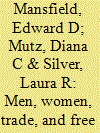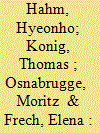|
|
|
Sort Order |
|
|
|
Items / Page
|
|
|
|
|
|
|
| Srl | Item |
| 1 |
ID:
139531


|
|
|
|
|
| Summary/Abstract |
In this paper, we provide one of the first systematic analyses of gender's effect on trade attitudes. We draw on a unique representative national survey of American workers that allows us to evaluate a variety of potential explanations for gender differences in attitudes toward free trade and open markets more generally. We find that existing explanations for the gender gap, most notably differences between men and women in economic knowledge and differing material self-interests, do not explain the gap. Rather, the gender difference in trade preferences and attitudes about open markets is due to less favorable attitudes toward competition among women, less willingness to relocate for jobs among women, and more isolationist non-economic foreign policy attitudes among women.
|
|
|
|
|
|
|
|
|
|
|
|
|
|
|
|
| 2 |
ID:
145098


|
|
|
|
|
| Summary/Abstract |
What are the ideological sources of free trade attitudes? Free trade plays a crucial role in classical liberal theory as a way of increasing the prospects of peace between states. Are liberal individuals more supportive of free trade? The literature on foreign policy beliefs largely neglects the question of trade, and those exceptions that find support for the liberal hypothesis generally rely on faulty conceptualization. Using surveys of the American mass public and American elites, this article finds that the combination of views that marks classical liberalism does not in fact predict support for free trade at either the mass or the elite level. Support for free trade at the mass level has libertarian, not liberal, foundations, predicted by a combination of social and economic libertarianism. At the mass level, the combination of cosmopolitanism and dovishness that constitutes foreign policy liberalism has no effect on trade attitudes. At the elite level, cosmopolitanism is actually generally negatively associated with support for free trade. Free trade is a wedge issue that creates strange alliances at the elite level between cosmopolitans and isolationists generally hostile to one another on foreign policy and at the mass level between social and economic libertarians typically antagonistic to each other's domestic agenda.
|
|
|
|
|
|
|
|
|
|
|
|
|
|
|
|
| 3 |
ID:
169323


|
|
|
|
|
| Summary/Abstract |
What type of trade agreement is the public willing to accept? Instead of focusing on individual concerns about market access and trade barriers, we argue that specific treaty design and, in particular, the characteristics of the dispute settlement mechanism, play a critical role in shaping public support for trade agreements. To examine this theoretical expectation, we conduct a conjoint experiment that varies diverse treaty-design elements and estimate preferences over multiple dimensions of the Transatlantic Trade and Investment Partnership (TTIP) based on a nationally representative sample in Germany. We find that compared to other alternatives, private arbitration, known as investor-state dispute settlement (ISDS), generates strong opposition to the trade agreement. As the single most important factor, this effect of dispute settlement characteristic is strikingly large and consistent across individuals’ key attributes, including skill levels, information, and national sentiment, among others.
|
|
|
|
|
|
|
|
|
|
|
|
|
|
|
|
|
|
|
|
|